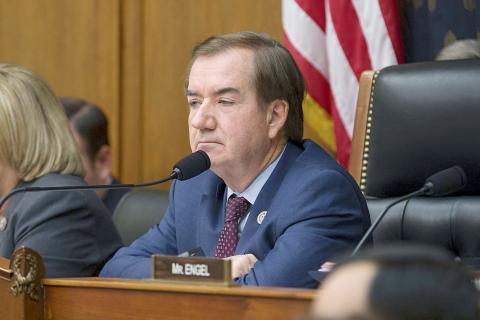Several US lawmakers on Thursday expressed concern over China’s redoubled efforts to isolate Taiwan and the US government’s indecision on arms sales to Taiwan.
In a hearing on Taiwan-US ties, the US House of Representatives’ Committee on Foreign Affairs Chairman Ed Royce said it is more important than ever to reassure Taipei of Washington’s commitment to the relationship, at a time when Taiwan is facing new challenges as a result of changes in cross-strait and global dynamics.
Royce cited as examples Panama’s decision to break off decades of diplomatic relations with Taiwan because of inducements from Beijing, and Taiwan’s exclusion from this year’s World Health Assembly due to Chinese obstruction.

Photo: EPA
Delays by successive US administrations on arms sales notifications for Taiwan “have needlessly dragged out the arms sales process,” he said.
“I hope to see regular notifications in the future and look forward to the announcement of new sales this year,” Royce said.
The administration of former US president Barack Obama reportedly planned to approve an arms sales package worth more than US$1 billion to Taiwan late last year, but did not do so.
Contrary to expectations that the administration of US President Donald Trump would move the package forward quickly, the deal has been delayed to avoid angering China, as Washington is seeking Beijing’s help in dealing with North Korea, US media reports have said.
At Thursday’s hearing, US Representative Brad Sherman said that although maintaining ties with China is important to the US and it needs Beijing’s help to solve certain problems, Taiwan should not become a bargaining chip in US-China relations.
US Representative Ted Yoho, chairman of the Subcommittee on Asia and the Pacific, said that since 2008, arms sales have been delayed so that they can be bundled together and their timing can be manipulated.
The US has not completed an arms sale to Taiwan since 2015, despite China’s increasing global military ambitions, Yoho said.
“The arms sales process has become a political calculation designed to minimize friction with the PRC,” he said, referring to the People’s Republic of China.
“Not only does this concede to Beijing a degree of influence over our arms sales process, it seems to contravene [former US] president [Ronald] Reagan’s assurance that the PRC would not be consulted on arms sales to Taiwan,” he said.
Saying that the geopolitical reality that held when the US established its “one China” policy has changed, Yoho proposed that Washington sign a fourth communique with Beijing to spell out clearly what the US would do to contain China’s clout.
American Enterprise Institute Asian Studies director Dan Blumenthal disagreed on the need for a fourth communique.
He said that China should abide by the three existing communiques and that the US has its own “one China” policy to implement.
He urged the Trump administration to include Taiwan in its Asia-Pacific strategy, particularly on the South China Sea issue.
On the question of whether Taiwan will be able to acquire F-35 jets from the US, Blumenthal said a key issue is whether Taiwan can afford the aircraft’s exorbitant costs, adding that many other options are available for US-Taiwan security cooperation.

Chinese spouse and influencer Guan Guan’s (關關) residency permit has been revoked for repeatedly posting pro-China videos that threaten national security, the National Immigration Agency confirmed today. Guan Guan has said many controversial statements in her videos posted to Douyin (抖音), including “the red flag will soon be painted all over Taiwan” and “Taiwan is an inseparable part of China,” and expressing hope for expedited reunification. The agency last year received multiple reports alleging that Guan Guan had advocated for armed reunification. After verifying the reports, the agency last month issued a notice requiring her to appear and explain her actions. Guan

GIVE AND TAKE: Blood demand continues to rise each year, while fewer young donors are available due to the nation’s falling birthrate, a doctor said Blood donors can redeem points earned from donations to obtain limited edition Formosan black bear travel mugs, the Kaohsiung Blood Center said yesterday, as it announced a goal of stocking 20,000 units of blood prior to the Lunar New Year. The last month of the lunar year is National Blood Donation Month, when local centers seek to stockpile blood for use during the Lunar New Year holiday. The blood demand in southern Taiwan — including Tainan and Kaohsiung, as well as Chiayi, Pingtung, Penghu and Taitung counties — is about 2,000 units per day, the center said. The donation campaign aims to boost

The Kaohsiung Tourism Bureau audited six hotels in an effort to prevent price gouging ahead of Korean band BTS’ concert tour in the city scheduled for Nov. 19, 21 and 22 this year. The bureau on Friday said that the audits — conducted in response to allegations of unfair pricing posted on social media — found no wrongdoing. These establishments included the local branches of Chateau de Chine, Hotel Nikko, My Humble House, and Grand Hai Lai, it said, adding that the Consumer Protection Commission would have penalized price gougers had the accusations been substantiated. The bureau said the Tourism Development Act

BACK TO WINTER: A strong continental cold air mass would move south on Tuesday next week, bringing colder temperatures to northern and central Taiwan A tropical depression east of the Philippines could soon be upgraded to be the first tropical storm of this year, the Central Weather Administration (CWA) said yesterday, adding that the next cold air mass is forecast to arrive on Monday next week. CWA forecaster Cheng Jie-ren (鄭傑仁) said the first tropical depression of this year is over waters east of the Philippines, about 1,867km southeast of Oluanpi (鵝鑾鼻), and could strengthen into Tropical Storm Nokaen by early today. The system is moving slowly from northwest to north, and is expected to remain east of the Philippines with little chance of affecting Taiwan,